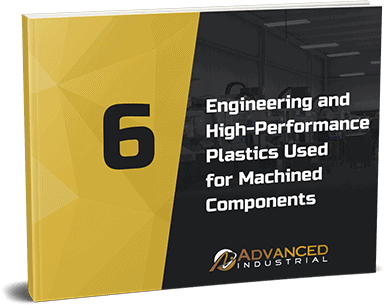PEEK Machining Benefits
Polyether ether ketone (PEEK) machining is the process of cutting, shaping, or drilling PEEK to create custom parts or components for various applications. PEEK is a high-performance thermoplastic with a unique combination of excellent mechanical, thermal, and chemical properties. Complex CNC machines are utilized for slicing or forming the plastic stock into the desired dimensions during machining.
PEEK machining is a complex process that demands specialized equipment, knowledge, and expertise. It also requires meticulous attention to detail regarding cutting speed, cooling, and tooling to prevent heat buildup and material degradation. Nevertheless, this technique ensures the production of top-quality parts and components that meet exact specifications.
Here are some of the most significant PEEK machining benefits:
1. High Temperature Resistance
PEEK can withstand temperatures up to 260 °C (500 °F) continuously, making it ideal for high-temperature environments. It also has excellent thermal stability due to its unique molecular structure. This features a rigid backbone and strong carbon-to-carbon bonds that offer high resistance to thermal degradation.
2. Excellent Strength and Durability
Excellent strength and durability are among the most notable PEEK machining benefits, making it an ideal technique for the automotive and aerospace industries. The material retains its integrity even in harsh chemical and environmental conditions, and it can withstand mechanical stresses without deforming or breaking.
3. High Wear and Abrasion Resistance
PEEK has a low friction coefficient, so it can resist wear and abrasion caused by repeated contact with other materials. Its standout hardness and toughness also make it resistant to surface damage and scratching. This ensures it retains its mechanical properties even after prolonged use.
4. Exceptional Chemical Resistance
Due to its stable molecular structure, it is resistant to a wide range of chemicals, including acids, bases, and organic solvents. This chemical resistance enables the machining process to retain the material’s mechanical and physical properties even after prolonged exposure to different substances. Some specific chemicals that PEEK is resistant to include sulfuric acid, hydrochloric acid, nitric acid, sodium hydroxide, methanol, ethanol, and toluene.
5. Superior Fatigue, Stress-Crack, and Creep Resistance
Versus polyketone, PEEK is a durable and reliable material for various applications due to its superior resistance to fatigue, stress-cracking, and creep. It can withstand repeated loading and unloading cycles without suffering damage. It can also resist cracks and fractures under heavy loads and maintain its shape properties even when subjected to long-term stress.
6. Very Low Moisture Absorption
Moisture absorption can weaken a material’s mechanical properties and dimensional stability, leading to warping, swelling, or cracking. However, PEEK’s low moisture absorption ensures it retains its strength, stiffness, and dimensional stability during machining. This advantageous property makes it suitable for machining medical devices where contact with fluids is unavoidable.
7. Excellent Inertness
Most PEEK grades and types exhibit excellent inertness, so it does not react with most chemicals or substances. This feature makes it suitable for machining parts and components in harsh or corrosive environments. Moreover, the material’s inertness is ideal for applications with critical purity or contamination control, such as in the medical or semiconductor industries.
8. Good Electrical Properties
Because of its high dielectric strength and low dielectric constant, PEEK-machined parts can insulate against high voltages while reducing electrical losses and signal distortions. They are also resistant to tracking and arcing, which ensures they can tolerate electrical stress and maintain their function over time.
9. Radiation Resistance
The combination of PEEK’s radiation resistance and low outgassing properties makes it an ideal machining material for rigorous applications in radiation environments. These include machining parts and components for nuclear power plants, aircraft hubs, and medical devices.
10. Biocompatibility
PEEK-machined products are non-toxic and do not cause any adverse reactions or tissue inflammation when implanted in the body. Because of their biocompatibility, they are also ideal for sterilization processes such as autoclaving and gamma radiation.
Get High-Quality Plastic Machined Components From Advanced Industrial!
At Advanced Industrial, we specialize in machining complex plastic parts using a wide range of materials! These include PEEK, PPS, Acetal, Ultem, PTFE, Ertalyte PET, and Nylon. Our dedicated team will collaborate closely with you to fully grasp your requirements and provide cost-effective, efficient solutions that meet your needs. We can also manufacture components to your precise specifications with utmost precision.
Contact us today to learn how we can help you with your next project!


